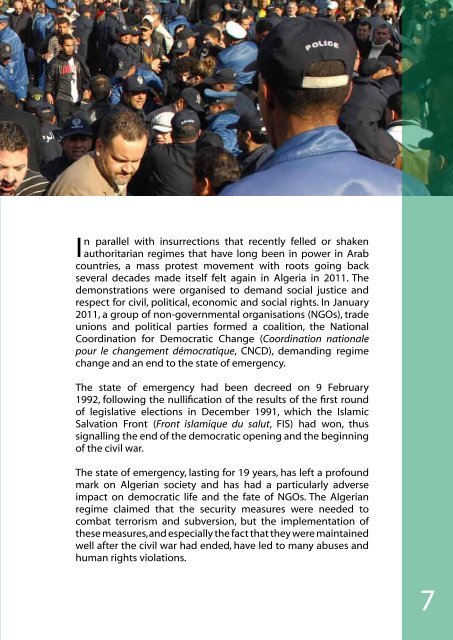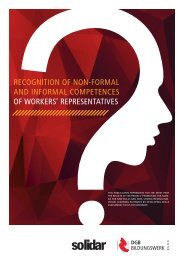Algeria - Solidar
Algeria - Solidar
Algeria - Solidar
You also want an ePaper? Increase the reach of your titles
YUMPU automatically turns print PDFs into web optimized ePapers that Google loves.
In parallel with insurrections that recently felled or shaken<br />
authoritarian regimes that have long been in power in Arab<br />
countries, a mass protest movement with roots going back<br />
several decades made itself felt again in <strong>Algeria</strong> in 2011. The<br />
demonstrations were organised to demand social justice and<br />
respect for civil, political, economic and social rights. In January<br />
2011, a group of non-governmental organisations (NGOs), trade<br />
unions and political parties formed a coalition, the National<br />
Coordination for Democratic Change (Coordination nationale<br />
pour le changement démocratique, CNCD), demanding regime<br />
change and an end to the state of emergency.<br />
The state of emergency had been decreed on 9 February<br />
1992, following the nullification of the results of the first round<br />
of legislative elections in December 1991, which the Islamic<br />
Salvation Front (Front islamique du salut, FIS) had won, thus<br />
signalling the end of the democratic opening and the beginning<br />
of the civil war.<br />
The state of emergency, lasting for 19 years, has left a profound<br />
mark on <strong>Algeria</strong>n society and has had a particularly adverse<br />
impact on democratic life and the fate of NGOs. The <strong>Algeria</strong>n<br />
regime claimed that the security measures were needed to<br />
combat terrorism and subversion, but the implementation of<br />
these measures, and especially the fact that they were maintained<br />
well after the civil war had ended, have led to many abuses and<br />
human rights violations.<br />
7

















